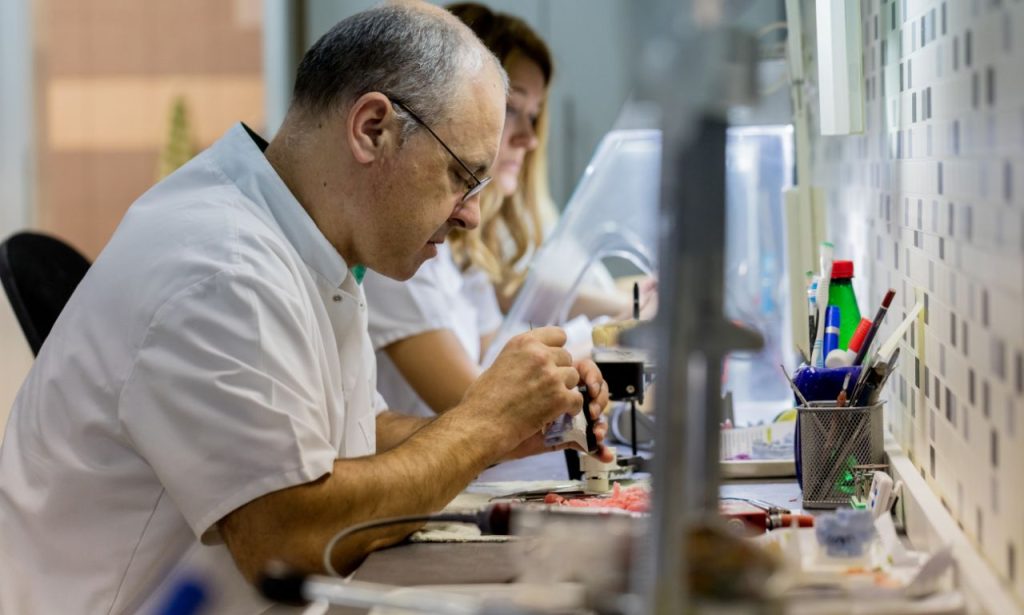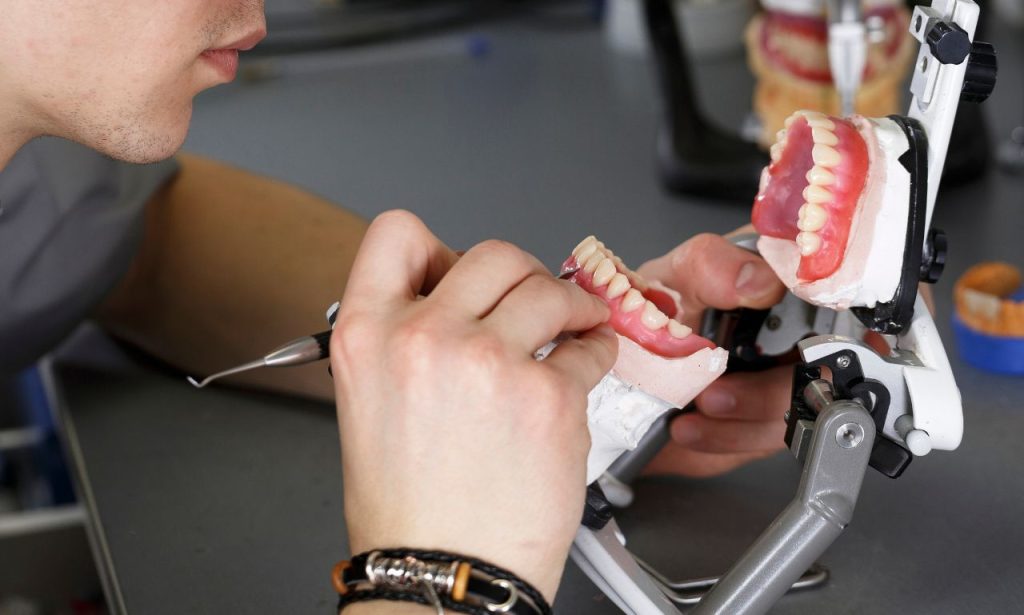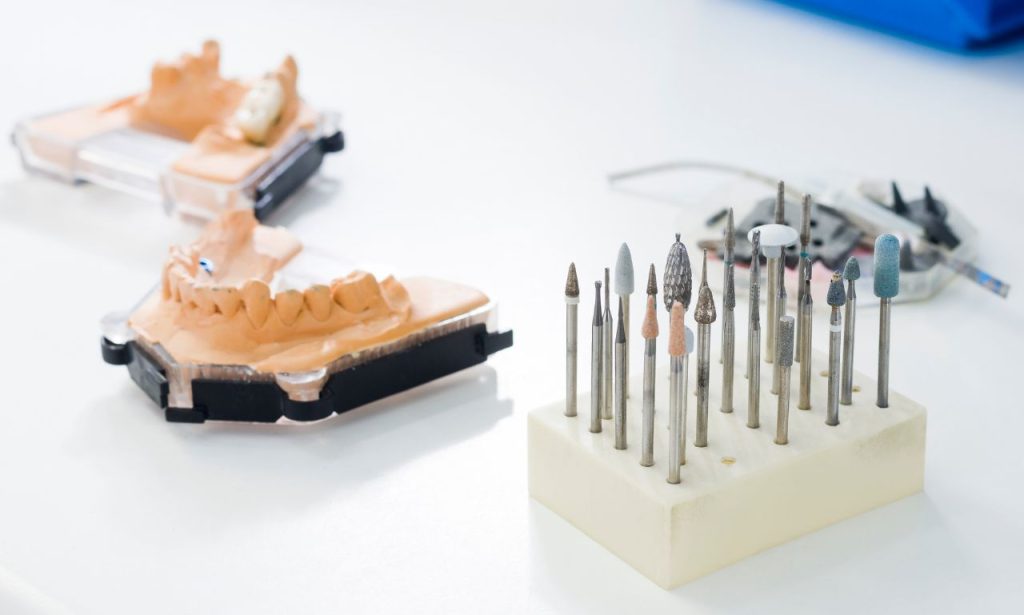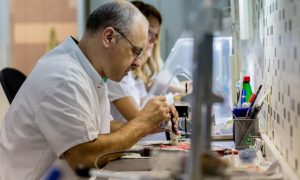Owning a dental lab can be a rewarding business venture, combining the precision of craftsmanship with the steady demand of the dental industry. As the bridge between dental professionals and patients, dental labs provide custom-made restorative dental products, such as crowns, dentures, and implants. This guide will walk you through the essential steps, considerations, and insights to help you own and operate a thriving dental lab.
Unlike most articles that merely scratch the surface, this comprehensive guide offers an in-depth look into every facet of dental lab ownership, from understanding the regulations to managing the finances. Whether you’re new to the industry or an experienced dental technician looking to take the next step, here’s how to turn your dream of owning a dental lab into a profitable reality.
Understand the Legalities of Dental Lab Ownership
The first step in learning how to own a dental lab is understanding the legal framework. Dental labs operate under strict regulations, and complying with these requirements ensures a safe, effective, and trustworthy business. Depending on your location, you will need to obtain certain licenses, certifications, and permits.
Licensing Requirements
In most jurisdictions, dental lab owners are required to have specific licenses to operate legally. These may include a business license, certifications for handling medical materials, and adherence to local health codes. Additionally, some regions mandate accreditation from professional bodies like the National Board for Certification in Dental Laboratory Technology (NBC).
Compliance with Health and Safety Standards

Dental labs must also comply with health and safety standards, which involve ensuring the correct handling of potentially infectious materials and appropriate use of Personal Protective Equipment (PPE). Regular inspections by health authorities are likely, so make sure your lab maintains high cleanliness and quality control standards.
You might also need a certified dental technician (CDT) if you don’t hold that title yourself. Understanding these legalities can save you from hefty fines or penalties that could derail your business plans.
Determine If a Dentist Can Operate an In-House Lab
If you are a dentist exploring how to own a dental lab, you might consider whether integrating an in-house lab into your practice is feasible. This is an increasingly popular option that offers several advantages.
Advantages of an In-House Lab
Operating an in-house dental lab allows for greater control over the quality and turnaround time of restorations. You can cater to urgent cases quickly, minimize errors by communicating directly with technicians, and customize products to suit patient needs. This integration can improve patient satisfaction, potentially boosting your clinic’s reputation.
Regulatory Considerations
However, regulations often differ for dental practitioners running in-house labs compared to standalone labs. It is crucial to verify if your state or country allows dentists to run a lab without separate licensing. Additionally, remember that owning an in-house lab requires a higher level of initial investment and operational involvement.
Explore the Average Startup Costs for Opening a Dental Lab
Understanding the costs involved is crucial when considering how to own a dental lab. The investment can vary widely depending on your location, the scale of your lab, and the equipment you intend to purchase.
Initial Investment Breakdown
- Facility Costs: Renting or purchasing space for your lab is one of the biggest upfront expenses. A suitable facility should have enough space for equipment, materials, and staff, while also being easily accessible for deliveries.
- Equipment: High-quality equipment such as milling machines, 3D printers, scanners, furnaces, and hand tools are essential. The cost of equipping a dental lab can range from $50,000 to $200,000 depending on the technology and quality you choose.
- Materials and Supplies: You’ll also need materials like dental alloys, ceramics, resins, and impression trays. Purchasing these materials in bulk can help reduce costs.
- Licensing and Permits: As previously discussed, you must factor in the cost of licensing and permits required to operate legally.
The average startup cost for a dental lab can range from $100,000 to $250,000, but having a solid financial plan can help mitigate unexpected expenses.
Assess Potential Profitability and Return on Investment
A key factor in deciding whether to open a dental lab is understanding the profitability and return on investment (ROI). The dental lab business can be highly profitable, provided you establish a strong client base and maintain quality.
Revenue Streams
Your primary source of revenue will be dental restoration services like crowns, bridges, dentures, and implants. Depending on your niche, you may also explore providing custom orthodontic appliances or working with dental offices to supply models for educational purposes.
Calculating ROI
To calculate ROI, consider factors such as the volume of orders you can handle, the pricing of your services, and operational costs. On average, dental labs have profit margins between 15-25%. With efficient management and a loyal customer base, this number could be even higher. By offering specialized services that are in high demand, such as zirconia crowns or same-day restorations, you can further boost profitability.
Identify the Necessary Equipment for a Dental Lab
The choice of equipment can make or break your dental lab. Your goal should be to balance high-quality output with operational efficiency. Below are some of the critical pieces of equipment that any dental lab needs.
Essential Equipment
- 3D Printer: Used for creating precise models, guides, and even prosthetics. A 3D printer helps improve accuracy and speeds up the production process.
- CAD/CAM Milling Machine: Essential for creating customized dental restorations, such as crowns and bridges, with high precision.
- Dental Scanner: Dental scanners capture impressions digitally, reducing errors compared to traditional methods and providing faster production times.
- Ovens and Furnaces: These are used to bake ceramics for crowns, bridges, and other restorations. A programmable furnace that handles different materials is ideal.
Having a mix of cutting-edge and reliable conventional equipment will help you keep up with the latest trends while also catering to traditional needs.
Evaluate Talent Recruitment and Staffing Needs
To succeed, you must hire experienced staff capable of maintaining high standards in dental restoration. Recruitment should focus on balancing expertise with fresh talent eager to learn.
Key Roles
- Certified Dental Technician (CDT): A CDT has advanced skills in creating dental appliances, which can be invaluable for complex restorations.
- Dental Technicians: Dental technicians work with materials like metal, porcelain, and wax to create restorations based on dentist prescriptions.
- Administrative Staff: Hiring administrative staff to handle communication, orders, inventory, and client relations will streamline your operations, allowing you to focus on production quality.
Staffing decisions will ultimately depend on the size and scope of your dental lab, but finding the right people is critical to ensuring efficient operations and high-quality output.
Build Relationships with Reliable Vendors and Suppliers
Running a successful dental lab means partnering with reliable suppliers who can provide high-quality materials and equipment consistently.
Selecting Vendors
Research different vendors based on cost, quality, delivery times, and customer service. Building relationships with multiple suppliers can help mitigate the risk of material shortages and provide more competitive pricing options.
Negotiating Contracts
Negotiate favorable contracts with suppliers, particularly for frequently used materials like dental alloys and ceramics. Bulk purchasing agreements can lead to discounts, which can help reduce operational costs over time.
Analyze Market Demand for Dental Lab Services
Understanding the market demand for dental lab services is crucial before starting your business. Conducting a comprehensive market analysis will help you understand your potential clients and their needs.
Identifying Your Target Audience
Your primary audience will be dental clinics and practitioners in your area. A thorough market analysis will help determine which services are in high demand, such as clear aligners or metal-free restorations. The analysis can also help you determine if there’s a niche that you can capitalize on.
Competitor Analysis
Identifying your competition will give you an understanding of the market’s saturation level and what differentiates your competitors. Analyze factors such as pricing, range of services, delivery times, and customer feedback.
Comprehend Regulatory Requirements for Dental Labs
A critical aspect of owning a dental lab is adhering to regulatory requirements. These regulations ensure the safety of the dental products being produced and compliance with public health standards.
FDA and Local Health Regulations
Dental labs must comply with Food and Drug Administration (FDA) guidelines in the United States or equivalent health authorities in other regions. These regulations often govern materials used in restorations and standards for the lab environment.
Employee Health and Safety Regulations
In addition to product safety, you must ensure that your staff operates in a safe environment. Familiarize yourself with Occupational Safety and Health Administration (OSHA) standards, which govern workplace safety, handling of hazardous materials, and use of PPE.
Investigate Competition in Your Area
Conducting a local competitive analysis will help you understand what other labs offer, their pricing, and their strengths. This information is crucial for positioning your lab uniquely and competitively in the market.
Competitor Profiling
Create a profile for each competitor in your area. Note their strengths, weaknesses, and the services they provide. This will help you identify gaps in the market that you can fill, such as faster turnaround times or specialized products.
Identifying Your Unique Selling Proposition (USP)
To stand out, you must define a unique selling proposition (USP). This could be specialized services, the use of advanced technology, or even superior customer service. Emphasizing your USP will help you gain a competitive edge and attract more clients.
Develop a Comprehensive Business Plan

A solid business plan is the backbone of any successful business venture. For your dental lab, a well-thought-out plan should include market research, financial projections, an operational plan, and a marketing strategy.
Key Components of a Dental Lab Business Plan
- Executive Summary: Provide an overview of your business, including mission, goals, and the services you offer.
- Market Research: Detail your target audience, their needs, and how your lab will address them.
- Operational Plan: Describe your production processes, equipment, staffing, and quality control measures.
- Financial Projections: Include estimated startup costs, revenue projections, cash flow forecasts, and a break-even analysis.
- Marketing Strategy: Explain how you will promote your services to attract dental clinics and practitioners.
A comprehensive business plan will not only guide you through the process of establishing your lab but will also help secure funding from investors or banks.
Outline Services Offered by the Lab
Your dental lab’s service offerings will define your niche in the market. Consider the current trends and needs within the dental industry to determine which services will be most beneficial to offer.
Core Services
- Crown and Bridge Restorations: Fabricating high-quality crowns and bridges is a staple service for most dental labs.
- Dentures: Complete and partial dentures are also commonly requested products that dental labs provide.
- Orthodontic Appliances: Offering orthodontic solutions like retainers and aligners could help diversify your clientele.
- Implants: Dental implants require precision and skill, but they are highly profitable and in demand.
Adding services that use advanced technology, such as digital impressions or CAD/CAM-produced restorations, can help your lab stay competitive.
Create Effective Marketing Strategies
Marketing your dental lab effectively is crucial to ensure a steady stream of clients. Targeting dental clinics and practitioners and convincing them to use your services requires a strategic approach.
Digital Marketing
Having a professional website that highlights your services, staff credentials, and the benefits of partnering with your lab is essential. Investing in SEO will help your site rank well for searches related to dental lab services in your area, increasing visibility.
Relationship Building
Building personal relationships with local dentists is one of the best ways to market your lab. Networking events, industry conferences, and trade shows provide opportunities to showcase your expertise and establish connections.
Referral Programs
Creating a referral program can also help attract new clients. Encourage existing clients to refer other dentists by offering discounts or other incentives.
Estimate Operational and Ongoing Costs
Once your lab is up and running, you will need to manage the ongoing operational costs. Estimating these costs beforehand will help ensure that you maintain healthy cash flow.
Monthly Expenses
- Rent and Utilities: Unless you own your premises, rent will be a significant ongoing expense. Additionally, utilities like electricity, water, and internet will add up.
- Salaries: Employee salaries and benefits will likely be your largest recurring expense. Having a plan for payroll management is vital.
- Materials: The cost of consumable materials, such as dental ceramics, alloys, and resins, will fluctuate based on demand. Maintaining good supplier relationships can help manage these costs.
- Marketing and Sales: Budget for ongoing marketing efforts to attract and retain clients.
Tracking these costs will allow you to make informed decisions and adjust operations as needed to stay profitable.
Establish a Financial Management System

Proper financial management is crucial for long-term success. A well-implemented financial management system will help you track expenses, income, and profitability.
Bookkeeping and Accounting
Consider using accounting software such as QuickBooks or Xero to manage your finances. Hiring an accountant is also advisable, particularly if you are unfamiliar with the complexities of business finance.
Financial Projections and Cash Flow Management
Make projections for cash flow based on your sales and expected expenses. Understanding when your cash flow will peak and dip will help you plan for slow periods and prevent financial shortages.
Conclusion
Owning a dental lab requires a combination of technical knowledge, business acumen, and a thorough understanding of the dental industry’s needs. By following these steps—from understanding legalities to building relationships with suppliers and crafting an effective marketing strategy—you can establish a successful, profitable dental lab. Remember, the key to thriving in this competitive industry is offering consistent quality, cultivating strong professional relationships, and staying abreast of new technologies and market demands.
If you commit to excellence in every aspect of your dental lab, you’ll not only be providing an essential service to dentists but also contributing to the oral health and satisfaction of countless patients.
ALSO READ: Can a Foreigner Open a Restaurant in Thailand?
FAQs
The licensing requirements depend on your location. Generally, you will need a business license, health permits, and in some cases, certification from recognized professional organizations.
The startup cost of a dental lab typically ranges from $100,000 to $250,000, including facility, equipment, and initial supplies.
Yes, dentists can own in-house labs, which allows greater control over product quality and turnaround times. However, regulatory requirements may vary based on your location.
Essential equipment includes a 3D printer, CAD/CAM milling machine, dental scanner, ovens, and a variety of hand tools.

